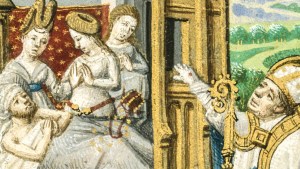Catholics in the United States are in a strange spot, in between Thanksgiving and December 25. The world around us calls it “the Christmas Season” — but our Church calendars call it “the Advent Season.”
Everyone around us is saying “Merry Christmas!” We would rather say “Blessed Advent.” The grocery store is playing “O Come, All Ye Faithful!” but our hearts are singing “O Come, O Come, Emmanuel.”
As a lover of both my faith and my culture, here is one way I give — not three cheers but maybe two? — to secular Christmas
First, it’s important to understand where “secular Christmas” comes from.
Celebrations of the Lord’s Nativity have taken various shape through the ages, but gigantic events shaped our Christmas: the Protestant reformation and the Enlightenment.
As these captured more and more ground in the West over centuries, they created two camps of “cultural influencers,” to use the current term. Protestant influencers didn’t like Catholic things, and “Enlightened” influencers didn’t like Christian things.
That meant that Christmas had to hide itself more and more. Some symbols like Christmas trees and wreaths were seized upon as neutral ground, but all those beautiful old Catholic customs — including Advent — had to be replaced with something.
Two strains of Christmas stories grew up. One was the “visitor from heaven” strain.
Twas the Night Before Christmas was written in 1822, nearly 200 years ago, and it was a popular expression of a folk tale about old St. Nick coming with presents. Other cultures had different figures of this kind — but each can be seen as a kind of proxy for heaven coming to earth in the person of Jesus Christ.
Then, of course the genre ballooned from there, with a proliferation of fantastic stories of other-worldy visitors, from Rudolph to Frosty the Snowman to Elf.
Another strain of Christmas stories are of the “change your heart” variety.
A Christmas Carol by Charles Dickens was written in 1843, and it was about Ebenezer Scrooge’s encounter with his past, present, and future — a perfect representation of Advent practices where we confess past sins, pray and fast to perfect our present, and look to our future by almsgiving and personal reform.
From there came a proliferation of “change your heart” Christmas stories, from “The Gift of the Magi” to It’s a Wonderful Life to The Grinch Who Stole Christmas and Hallmark Christmas movies.
What the stories don’t speak of much is Jesus Christ being born.
I wish they did, but I understand why they don’t. I love a passage my friend Rebecca Teti pointed out from Cardinal Joseph Ratzinger.
Before becoming Pope Benedict XVI, he once wrote that “nowadays a theologian or a preacher is all but expected to heap more or less sarcastic criticism on our popular way of celebrating Christmas … Christmas, we are told, has been commercialized irredeemably and has degenerated into a senseless marketing frenzy; its religiosity has become tacky.”
He admitted that the criticism is justified, but said it points to something deeper.
He said we put a “sentimental framework” around Christmas, because the human heart, battered by secular skepticism and scorn is “reluctant to expose [our hearts] to the gaze of the other” and requires a “protecting shield” to contemplate Christ.
So we find ways to express how we feel with decorations and songs and gifts.
We treat Christmas through sentimentality for the same reason we talk about other important things in euphemisms — such as marital intimacy and death. Their power is too raw to address directly, but they are too important to ignore.
Ratzinger said our Christmas gift-giving partakes of the same phenomenon: “Does it not originate in … the inner urgency of love, with its compulsion to share, to give of oneself to the other?” he asks. “And does not the notion of giving transport us directly into the core of the mystery that is Christmas?”
Christmas gifts are a great thing, but only because they point to “The one genuine Christmas gift to mankind, to history, to each one of us,” wrote Ratzinger: “None other than Jesus Christ himself.”
So, two cheers for secular Christmas.
Or, better, let’s call it “sentimental Christmas.” Let’s celebrate it with our neighbors, but go deeper.
Santa Claus is great, but we have personally met a real and far greater figure who is coming to town, and he, too, knows if you’ve been bad or good.
The Grinch’s purpose of amendment made his heart grow three sizes, but we know a good confession can make our own hearts grow infinitely, in union with the Sacred Heart.
But the song has it right. Truly, “It’s beginning to look a lot like Christmas” — and the most important thing is the carol that you sing, right within your heart.
~
Click here for more thoughts on Secular Chistmas in Tom Hoopes’ podcast, Catholic Living


